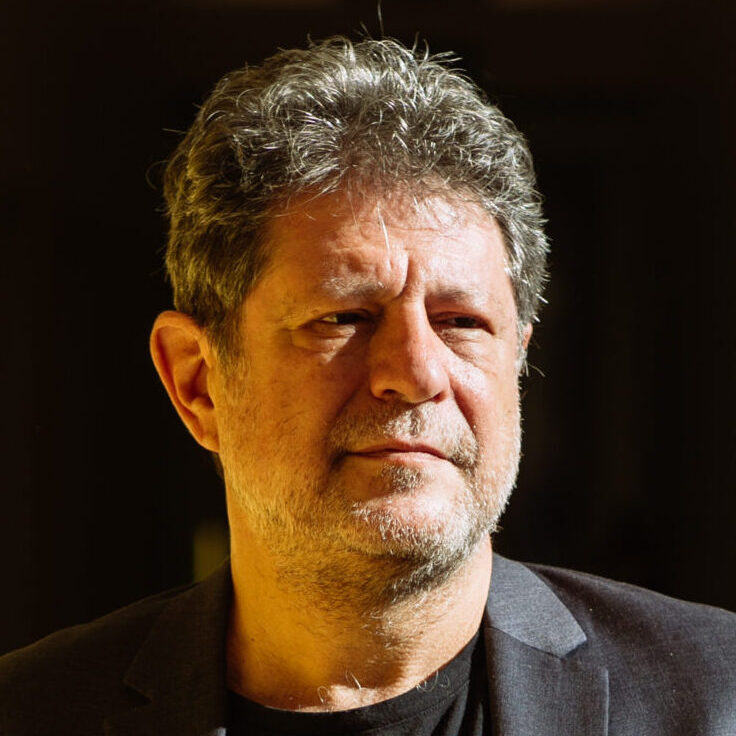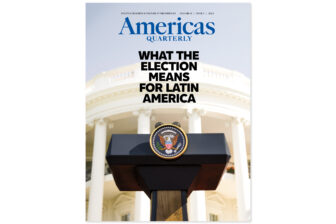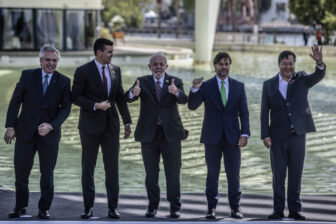Much has been said about the growing political discontent throughout Latin America, where a declining percentage of the population is satisfied with democracy—even in countries where social indicators have been improving such as Chile, Colombia, or Peru. There is a paradox that goes as far back as the nineteenth-century work of Alexis de Tocqueville: Social frustration often grows as social conditions improve. The symptoms of this malady are well known: a mistrust of the system; a disenchantment with traditional politics and politicians; a social fatigue prone to explode into civil unrest; and the rise of outsiders with a vague anti-system rhetoric catering to, and further fueling, ideological extremes and antagonistic polarization.
The Latin American champions of today’s “politics of emotion”—Jair Bolsonaro, Nayib Bukele, or Javier Milei on the right; Andrés Manuel López Obrador or Gustavo Petro on the left—have blossomed as a challenge to traditional politics, hollowing out the distribution of voters to the extreme positions of outsider populism and dividing societies into antagonistic groups: “the pure” and “the corrupt,” to use the words of Cas Mudde. “Us” versus “them”: a self-serving confrontation that often justifies a steady backsliding into increasingly illiberal democracies.
As the title of a recent collections of essays claims, the center must hold. This is more than a well-meaning abstraction: The center, at its best, is an essential middle ground where right and left meet to distill policies that can survive political alternation and be owned by society at large. It has been at the heart of some of Latin America’s most important and enduring advances over the last 30 years. While it may be regarded today as unfashionable throughout the region and indeed the West, centrism continues to survive and produce results in a few places like Uruguay, where the diversity of interests is reflected without the “negative identification” that characterizes political affinity in polarized countries.
Overcoming our tribalist moment
The obstacles to a new centrism today, however, are formidable.
In 2017, one of us asked a diverse group of people in Argentina who they would vote for in a presidential election: Cristina Fernández de Kirchner (CFK) or Mauricio Macri. Then we asked them how much they agreed with a hypothetical introduction of a universal basic income (UBI). CFK’s voters approved it by 50%; Macri’s voters by 66%. We repeated the experiment, but this time we asked how much they agreed with a UBI plan proposed by CFK. Now, her voters supported UBI by 92%, and Macri’s by 7%. We repeated the experiment, swapping names. How much would they agree with the UBI plan proposed by Macri? Now, CFK’s voters supported it by 14%; Macri’s voters by 84%.
If we had conducted this experiment with political parties, the study would have been reminiscent of Geoffrey Cohen’s work on the “tribalist” nature of ideologies, “Party over Policy.” Recognizing both the inspiration and the novelty of our own experiment, we label ours “Leader over Policy.”
But the crucial point here relates to the paper´s coda: We repeated the experiment one last time, asking how much they agreed with a UBI proposed jointly by CFK and Macri. The support levels were then the same as they would have been if the project had no ownership at all; in some cases, they were even lower. The conclusion: Party loyalties do not add up; they cancel out or subtract from each other. Cooperation in today’s world is political kryptonite.
In the context of the contemporaneous polarization in Argentina—and, we conjecture, elsewhere—the identification is personal: It reflects the leader’s often changing views on anything from income tax deductibles to trade protectionism, including pension reform or illegal immigration—all examples that, like UBI, were examined in the paper with similar results. But, perhaps more importantly, the identification is also negative: Polarization acts through rejection, so approaching the views of “them” is seen as capitulation, if not treason.
No time for ‘gatopardismo’
Where does that leave us?
There are no silver bullets in this effort. The new centrists must not only innovate (in their priorities, strategies, and communication approach), but centrism should become a new political movement, rather than a return to the past.
A critical starting point to revive the center is to promote a new breed of politicians willing to break with the practices of corruption, nepotism and clientelism that have for so long characterized Latin America politics. The new center cannot be a recycling of insiders masqueraded as a transformation. The goal should not be to resuscitate the center but to reinvent it.
Any bogus staff change or gatopardismo (the Spanish term from Giuseppe Tomasi di Lampedusa’s novel The Leopard, summarised by the novel’s one-liner: “Everything needs to change for everything to stay the same.”) would be easily noted, only feeding back into further mistrust. While not every experienced politician is of the same mold, as they are often perceived to be, new centrists, and even old ones, would need to get out of the classic “politician” stereotype where years of—sometimes warranted—typecasting have cornered them. A strong rupture with traditional politicians is mandatory. Short-term opportunistic alliances will only undermine the viability of the political project.
This new brand of centrism will also need to master the novel communication tactics that populists have excelled at, such as the use of direct and simple messages and an appeal to emotion – positive emotions of hope rather than negative feelings of rage and fear. This must be done without falling into the trap of polarization or unfounded promises that will inevitably lead to disappointment. A new centrist will need to be unapologetic about its beliefs and unafraid to take on the populists and the myths that they sell to the public. Crucially, those tactics must be governed by a strategic direction: Moderation and balance should not be confused with accommodation and complacency.
The new centrists need a new policy agenda. They will have to address the region’s pervasive inequality and exclusion, and the resulting diminished expectations behind the non-cooperative, every-man-for-himself attitude that often characterizes outsider populism. And they will need to promote policies that improve living standards in the short term without compromising long-term sustainability. In other words, new centrists need to yield tangible results while avoiding the unattractive “short-term pain, long-term gain” rhetoric that breeds frustration and skepticism, ultimately empowering the populists. Inclusiveness, transparency and sustainability should be the keywords of the new call to action.
But a new centrist agenda also requires a deep change in political habits, a shift from quantity to quality, from the old-fashioned, passive distribution through fiscal transfers that make up for the failure of the welfare state to modern, proactive policies that prioritize labor training and access to quality public services, and a leaner and more efficient state. Actions that prove that politics is at the service of the people and not the other way round, as often perceived. In short, policies for fairness.
Finally, a new centrist agenda is bound to be a broader and younger one, covering the new inescapable challenges: Environmental care, technological innovation, migration and demographics, security, and the ever-changing balance between labor and leisure. This could be critical to engage with younger constituencies that will soon become the decisive majority in most Western democracies—not only as an opportunistic gesture: Representatives need to represent more than just their own age-specific concerns.
Making the center look strong again
In sports, poor players often waste energy, chasing after the ball or failing to anticipate the opponent, exhausting themselves with extra movements. Polarization in Latin America is a bit like those poor players: Unpredictable policy swings discourage investments and foster defensive (and inefficient) strategies, or the outright exit of the best thinkers, entrepreneurs, workers. The result: with a few short-lived exceptions, an underwhelming record of slow development and lost decades.
Centrism has the answers to many of Latin America’s problems. Centrists are capable of reaching a balance between short-term improvements and long-term results. Reforming and investing in areas that directly impact the middle class’s ability to grow steadily—education and health care, infrastructure and personal security, connectivity and access to credit—while preserving macroeconomic stability has been the cornerstone of the centrist approach.
However, the failure of populists is not bound to win back the lost electorate. It may just as easily send our battered democracies into a widening pendular swing between improvised right and left populisms for several years in a negative-sum polarization game.
To avoid this democratic undoing, we need a true regime change within the political tribe: A new breed of politicians that translates a broad and rejuvenated policy agenda from technocratic programming into a political platform with a sense of mission, including concrete actions in the areas that matter the most to voters.
If a crisis is also an opportunity, we are facing the opportunity of the century to rewrite the political center, the backbone of Western liberal democracies.
(*) This piece is based on “The Future of Liberal Democracy in Latin America: In Search of a Centre”, published in The Centre Must Hold, Elliott & Thomson, 2024










